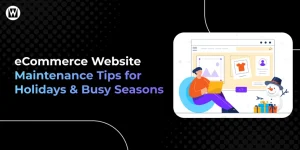How to Protect Your Website from Hackers with Routine Maintenance?
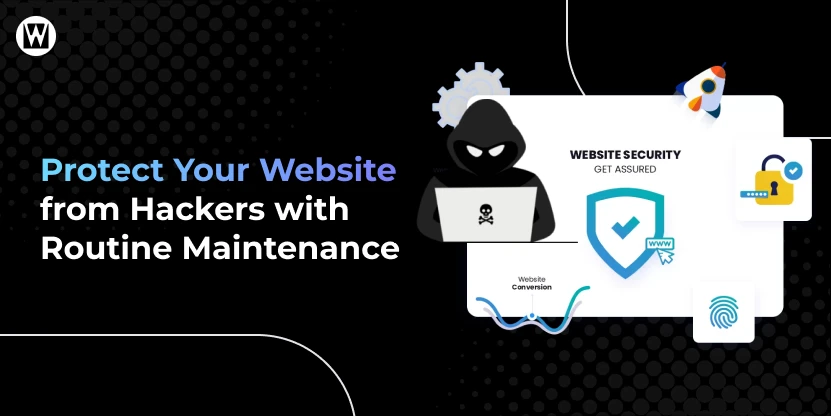
In today’s digital-first world, your website is more than just a storefront – it’s the beating heart of your business. But with all the convenience and connectivity comes a harsh reality: cybercriminals are everywhere. A staggering 43% of data breaches target small businesses, with many of these attacks exploiting weak points in websites that could have been easily avoided through routine maintenance.
The truth is, hackers don’t just go after big corporations with million-dollar budgets; they often see small businesses as easier targets, leaving your site vulnerable to attacks that can steal sensitive customer data, disrupt operations, and damage your reputation. With over 4,000 website attacks happening every day, it’s clear that securing your site is no longer optional.
But don’t worry – we’re here to help you! In this blog post, we’re going to turn the tables and arm you with powerful, actionable tips on how to protect your website from hackers through simple yet effective routine maintenance.
How to Protect Your Website from Hackers: 12 Crucial Tips
Protecting your website from hackers means more than just installing a security plugin or hoping for the best. It’s about building a strong defense, being protective, and making sure your website is always one step ahead of cybercriminals. Think of it like locking your front door, installing an alarm system, and keeping an eye on things every day – only in the digital world.
With the rise of online attacks, ensuring your site is secure is crucial. So, let’s dive into 12 practical tips that will keep your site safe and sound from hackers.
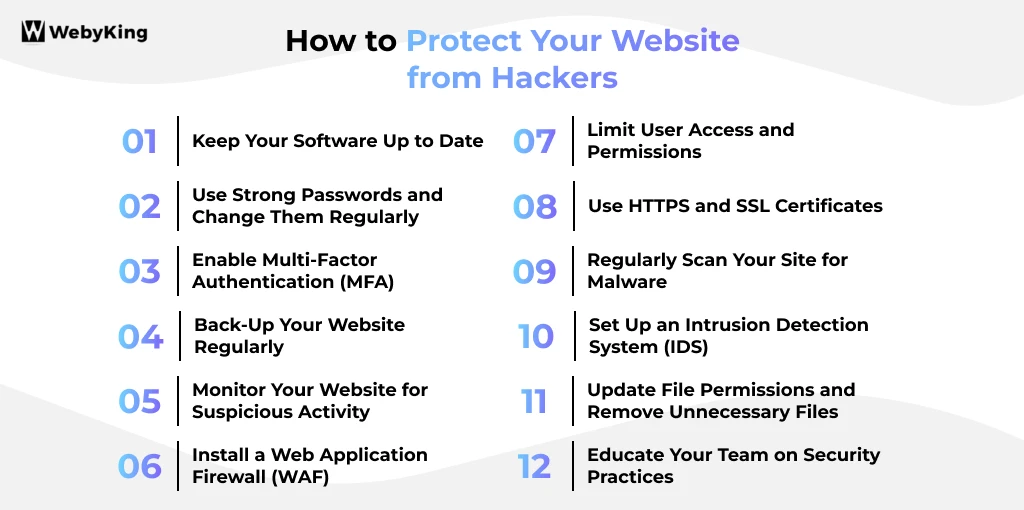
1. Keep Your Software Up to Date
Outdated software is like leaving a window wide open for hackers. Make sure your CMS (Content Management System), plugins, and themes are updated regularly to patch any security holes. Cybercriminals often target vulnerabilities in older versions, so staying up to date is your first line of defense.
2. Use Strong Passwords and Change Them Regularly
Weak passwords are an open invitation to hackers. Use long, complex passwords (think a mix of letters, numbers, and symbols). And don’t forget to change them regularly — at least every 3 to 6 months. It’s a small habit that makes a huge difference!
3. Enable Multi-Factor Authentication (MFA)
Adding a second layer of security can stop hackers in their tracks. Multi-factor authentication requires a second verification step, like a code sent to your phone, before accessing your site. Even if hackers guess your password, they’ll still be locked out.
4. Back Up Your Website Regularly
Regular backups are your emergency parachute. If anything goes wrong, having a recent backup of your website means you can restore it to its previous state quickly. Make sure your backups are stored securely, preferably in the cloud or an off-site location.
5. Monitor Your Website for Suspicious Activity
Always keep an eye on your website’s traffic for any unusual activity. Are there too many failed login attempts? Is there an unexpected spike in traffic? Tools like Google Analytics or security plugins can help you spot these red flags early.
6. Install a Web Application Firewall (WAF)
A WAF acts as a filter between your website and the internet, blocking malicious traffic before it even reaches your site. Think of it as a bouncer at the club – only letting the good guys in.
7. Limit User Access and Permissions
Not everyone needs full access to your site. Assign the latest amount of access necessary for each user to do their job. If someone doesn’t need admin privileges, don’t give them. Limiting user permissions reduces the risk of internal threats or accidental mistakes.
8. Use HTTPS and SSL Certificates
Websites that use HTTPS (instead of HTTP) encrypt all data exchanged between users and your website. SSL certificates are the key to that encryption. This is especially important if your site handles sensitive customer information, like credit card details.
9. Regularly Scan Your Site for Malware
10. Set Up an Intrusion Detection System (IDS)
An IDS helps you track unusual activity or unauthorized access attempts on your site. If a hacker is trying to break in, an IDS will alert you immediately, allowing you to act fast before they can do any real damage.
11. Update File Permissions and Remove Unnecessary Files
Old files, plugins, and themes can pose a security risk. If you’re not using them, delete them. Also, check your file permissions regularly to ensure hackers can’t access sensitive areas of your site.
12. Educate Your Team on Security Practices
Your team plays a key role in maintaining website security. Make sure they understand the basics of website security – from recognizing phishing emails to using strong passwords. Educated employees are one of your best defenses against cyber threats.
By following these 12 simple yet powerful tips, you’re building a strong defense that’ll help keep hackers out and your website safe. Remember, website security isn’t something you do once and forget — it’s an ongoing process. The more proactive you are, the harder it will be for hackers to break in!
Ready to Secure Your Website the Right Way?
Don’t leave your website’s safety to chance. Let our experts at WebyKing handle your routine maintenance and security, so you can focus on running your business with peace of mind. Stay protected, stay ahead.
Final Thoughts
By following the tips outlined above, you’re already on the right track to fortifying your website’s security and keeping hackers at bay. But remember, website security is an ongoing journey, not a one-time fix.
This is where WebyKing comes in. With years of experience and a dedicated team of website maintenance professionals, we’ll help you stay proactive and ensure your website is always up-to-date with the latest security patches and optimization strategies.
By partnering with a website maintenance expert like WebyKing, you can focus on growing your business while we focus on keeping your digital storefront secure. Together, let’s protect what matters most!
FAQs
How can I protect my website from hackers?
You can protect your website from hackers by regularly updating software, using strong passwords, enabling multi-factor authentication, backing up your site, and using a web application firewall.
Why is website maintenance important for security?
Routine website maintenance is important for security because it fixes vulnerabilities, ensures your software is updated, removes outdated files, and keeps your site protected from cyber threats.
What are the most common website security threats?
Common website security threats include malware, phishing, SQL injections, brute-force attacks, and cross-site scripting (XSS). Regular maintenance helps prevent these risks.
Do small businesses need website security?
Yes, small businesses need website security because hackers often target them, seeing them as easy targets due to weaker protection compared to larger companies.
What is a Web Application Firewall (WAF)?
A Web Application Firewall (WAF) is a security layer that filters, monitors, and blocks malicious traffic before it reaches your website, protecting it from hackers and attacks.
How does HTTPS keep a website secure?
HTTPS secures your website by encrypting data exchanged between the site and its users. It protects sensitive information like passwords and payment details from hackers.
Why should I back up my website regularly?
Regular website backups ensure that if your site is hacked or data is lost, you can quickly restore it to its original state without permanent damage.
Ravi Makhija, the visionary Founder and CEO of WebyKing, is a seasoned digital marketing strategist and web technology expert with over a decade of experience. Under his leadership, WebyKing has evolved into a premier full service web and marketing agency, delivering innovative solutions that drive online success. Ravi’s deep understanding of the digital landscape combined with his passion for cutting-edge technologies empowers him to consistently exceed client expectations and deliver results that matter.


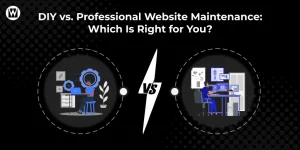
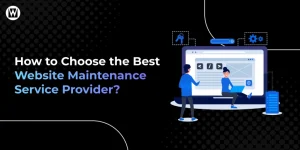
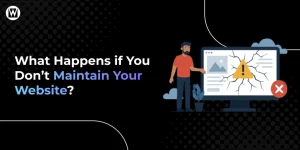
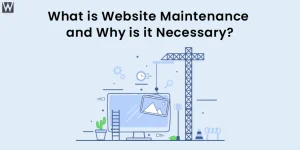
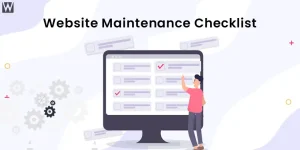
![How Much Does Website Maintenance Cost [A Detailed Pricing Guide] Featured Image on Website Maintenance Cost](https://www.webyking.com/wp-content/uploads/2022/04/website-maintenance-cost-300x150.webp)
